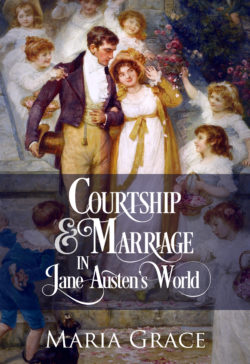Widows of Jane Austen’s World
 What was life like for the widows of Jane Austen’s world?
What was life like for the widows of Jane Austen’s world?
When a woman’s husband died, she was expected to spend a full year (long enough for a baby conceived in her marriage to be born) in full or deep mourning. During this time she was expected to dress in all black, refraining from public appearances. Movie adaptations of Sense and Sensibility portray Mrs. Dashwood in widow’s weeds. The next six months she would wear subdued colors like greys and lavenders, suitable for half-mourning and begin a slow reintroduction into society.
Many conduct writers suggested a widow should continue to live a life of somber retirement for the remainder of her life. Without the man who defined her legal personhood, society had a difficult time understanding what to do with her. Keeping her out of sight and out of mind was one way of dealing with that.
Widowhood effected women differently, according to their stations in life and the arrangements at the time of her marriage. They might enjoy freedoms they never previously experienced, find themselves thrust into desperation and poverty, or something in between.
Widows of the middling sort
Widows of the middle class might find themselves possessed of the means to enter into public life and earn an income without resorting to prostitution.
Single women and widows were able to exercise the same property rights as men. In some parishes they were even permitted to vote. Interestingly, they were entered in the tax records as ‘widows’ instead of by their occupation as men were, presumably because men’s occupations were far more important to defining them than were women’s. (Shoemaker, 1998)
What occupations might a widow take on?
Widows’ Occupations
The options a widow might have open to her varied widely with the resources available to her. Without education or assets she might seek a position as a housekeeper, either among relatives, or a paid position in a household.
If left with some education and some accomplishments, she might hire herself out as a governess or lady’s companion. Mrs. Jenkinson and Mrs. Younge, companions to young ladies of Pride and Prejudice were both likely widows.
Others turned to writing books on a variety of subjects including: children, household and cookbooks, conduct books and also history, biography and science. Publishing for public recognition was considered unwomanly, so many women published anonymously.
“Although publishing on commission was considered perfectly respectable, female writers usually preferred to sell the copyright of their works … She was paid by the publisher in a lump sum either on acceptance of the manuscript or within a year of publication of the book. No further communication need take place between him and the author until the end of the 14 or 28 years for which the copyright had been purchased.” (Collins, 1998)
If a woman had a house, she was in the happy position to be able to rent rooms to lodgers putting both her housekeeping expertise and her property to good use. A woman with some education and a house might use her home to run a school, possibly with the help of her older daughters.
With sufficient capital, a widow might continue on with her husband’s business. While too much ambition, especially for a high income, was discouraged, she would be permitted to enter into the market place. Shops and even farms might be and often were headed by widows.
Widows left with capital but no business often invested in loans or property and lived off the proceeds. “Research suggests that widows owned a sizable proportion of the London housing stock and played a vital role in the provision of loan capital through the bond and mortgage markets.” (Shoemaker, 1998) Female capital supported the joint stock companies behind municipal utilities and railways. Widows and spinsters were the core of those investors requiring a steady income without administrative worries. (Davidoff, 2002) Interesting, the important economic role played by individuals society didn’t have a place for.
Find References Here!
To Read more articles on weddings, click here.
To read more articles on courtship click here.
To read more articles on marriage click here.
Want to learn more? Try Courtship and Marriage in Jane Austen’s World, available in ebook and paperback
.
Please support this author and website by using this affiliate link.

I found this extremely interesting. I loved the part where society didn’t want to deal with widows… out of sight, out of mind… but, in fact… female capital was the ground on which they stood. Yeah, that’s forward thinking for you.
Isn’t though?
Well I assume that if a man’s wife died, he didn’t have to wear black for 12 months and avoid society? Or am I wrong?
Nope, not wrong. In part because he couldn’t be pregnant, he only might wear a black ribbon around his arm for a time. He could remarry very soon–after all who would run his house and managed the children if he didn’t have a wife?